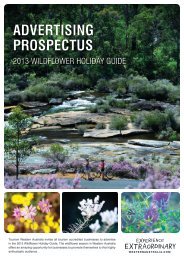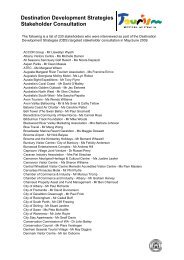A Strategic Approach to the Caravan and Camping Industry 2012
A Strategic Approach to the Caravan and Camping Industry 2012
A Strategic Approach to the Caravan and Camping Industry 2012
Create successful ePaper yourself
Turn your PDF publications into a flip-book with our unique Google optimized e-Paper software.
Sustainable Serviceability<br />
Recommendation 4: Create Public-Private Partnerships <strong>to</strong> Improve Delivery <strong>and</strong> Maintenance of <strong>Caravan</strong> <strong>and</strong> <strong>Camping</strong> Facilities<br />
<br />
<br />
<br />
<br />
Increase <strong>the</strong> supply <strong>and</strong> improve distribution, maintenance <strong>and</strong> cleanliness<br />
of publically accessible facilities such as dump points, <strong>to</strong>ilets <strong>and</strong> rest areas<br />
through co-locating (where practical) with existing businesses <strong>and</strong> entering<br />
in<strong>to</strong> cooperative arrangements for <strong>the</strong>ir management.<br />
Tender out Management Contracts for existing popular overnight camping<br />
locations including Main Roads Rest Areas <strong>and</strong> Shire Authorised<br />
Campgrounds <strong>to</strong> provide daily cleaning, maintenance, <strong>and</strong> moni<strong>to</strong>ring of<br />
permitted duration of stay.<br />
Implement a user pays (cost recovery) system <strong>to</strong> better distribute <strong>the</strong> cost<br />
burden of maintenance <strong>and</strong> cleaning.<br />
Enable Main Roads <strong>to</strong> focus <strong>the</strong>ir resources on <strong>the</strong> management of roads<br />
<strong>and</strong> safety by transitioning facilities that are predominantly used for<br />
<strong>to</strong>urism over <strong>to</strong> a more appropriate management structure.<br />
Issues <strong>and</strong> Risks<br />
Many rest areas, which are provided primarily for road safety, are being used as<br />
substitute caravan parks, with planned overnight s<strong>to</strong>ps <strong>and</strong> extended duration stays<br />
commonplace at <strong>the</strong>se ‘free’ camping areas.<br />
Heavy transport drivers can find it difficult <strong>to</strong> access some rest areas due <strong>to</strong> <strong>the</strong> high<br />
number of caravans <strong>and</strong> RVs taking up <strong>the</strong> space provided. Main Roads is embarking<br />
on <strong>the</strong> development of new <strong>and</strong> upgraded rest areas as a pilot in <strong>the</strong> Pilbara. It is<br />
proposed that <strong>the</strong>se rest areas will have ablution facilities, which may attract more<br />
‘free’ camping.<br />
Faced with a similar issue, <strong>the</strong> New Zeal<strong>and</strong> government recently introduced<br />
regulations <strong>to</strong> manage ‘freedom camping’ <strong>to</strong> minimise any negative impacts.<br />
However, a number of issues have arisen since <strong>the</strong> introduction of <strong>the</strong> new legislation<br />
including anti-social behaviour, fire risk, pollution of <strong>the</strong> environment, <strong>and</strong><br />
unauthorised <strong>and</strong> illegal use of caravan park facilities. The lack of regulation of <strong>the</strong><br />
‘free camping’ sites has had a negative impact on <strong>the</strong> peaceful enjoyment of those<br />
locations, by <strong>the</strong> consumers that lobbied for <strong>the</strong>m.<br />
Many self-contained travellers cherish <strong>the</strong> opportunity <strong>to</strong> camp free of charge, <strong>and</strong><br />
individuals <strong>and</strong> user groups are vocal in <strong>the</strong>ir criticism of Western Australia as being<br />
unfriendly where adequate ‘free camping’ <strong>and</strong> associated facilities are not provided.<br />
There is a cost associated with <strong>the</strong> provision, maintenance, cleaning <strong>and</strong> waste<br />
disposal at roadside s<strong>to</strong>ps, rest areas, authorised <strong>and</strong> unauthorised camping areas.<br />
This cost is normally borne by <strong>the</strong> ratepayer of <strong>the</strong> local government area, or state<br />
government agencies, including Main Roads.<br />
Due <strong>to</strong> <strong>the</strong>se costs, which are extremely high in some remote <strong>and</strong> regional locations,<br />
facilities are not maintained or cleaned as frequently as <strong>the</strong>y need <strong>to</strong> be. This results<br />
in significant complaints about <strong>the</strong> state of facilities, with some rendered unusable,<br />
particularly during peak times. There is also insufficient supply in some areas.<br />
There are currently issues with some people staying for extended durations at some of<br />
<strong>the</strong> states more appealing rest areas (particularly those alongside waterways), taking<br />
away opportunities for o<strong>the</strong>r visi<strong>to</strong>rs with genuine needs <strong>to</strong> be able <strong>to</strong> utilise <strong>the</strong><br />
provided facilities.<br />
There are potential public liability issues for government agencies <strong>and</strong> local<br />
governments which knowingly “turn a blind eye” <strong>to</strong> unmanaged camping activities<br />
that can place <strong>the</strong> public in dangerous situations. Fire risk, accidents between large<br />
transport vehicles <strong>and</strong> recreational vehicles competing for <strong>the</strong> same rest areas, health<br />
<strong>and</strong> security issues are all potential for litigation in <strong>the</strong> event that travellers suffer<br />
damage or loss.<br />
Strategy<br />
Main Roads could tender out supply opportunities for existing businesses <strong>to</strong> provide<br />
new rest areas <strong>and</strong> publically accessible ablution <strong>and</strong> dump point facilities on its l<strong>and</strong>.<br />
These could complement or replace existing facilities, depending on distribution of <strong>the</strong><br />
locations proposed by those who tender <strong>to</strong> supply <strong>the</strong> required services.<br />
Roadhouses, Stations, Indigenous Communities, <strong>Caravan</strong> Parks or o<strong>the</strong>r business types<br />
may tender <strong>to</strong> provide <strong>and</strong> maintain rest areas <strong>and</strong> facilities on a fee for service<br />
arrangement. Infrastructure could be provided by Government or supplied by <strong>the</strong><br />
tenderer by negotiation. A user pays system could be implemented <strong>to</strong> contribute <strong>to</strong><br />
<strong>the</strong> costs of providing <strong>the</strong>se services where appropriate.<br />
A <strong>Strategic</strong> <strong>Approach</strong> <strong>to</strong> <strong>Caravan</strong> <strong>and</strong> <strong>Camping</strong> Tourism in Western Australia Page 94




![Annual Report 2002 - 2003 [pdf ] - Tourism Western Australia](https://img.yumpu.com/27124309/1/186x260/annual-report-2002-2003-pdf-tourism-western-australia.jpg?quality=85)
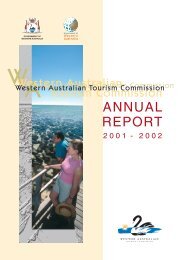
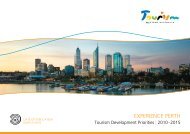
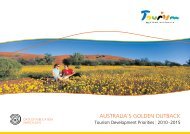
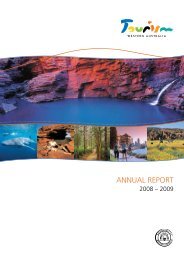
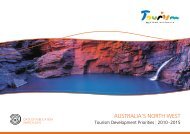

![Our Direction in China 2012 - 2015 [pdf ] - Tourism Western Australia](https://img.yumpu.com/27124271/1/184x260/our-direction-in-china-2012-2015-pdf-tourism-western-australia.jpg?quality=85)
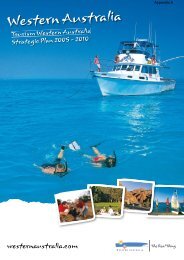

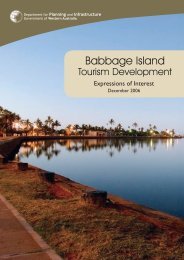
![Naturebank Program 2011 [pdf ] - Tourism Western Australia](https://img.yumpu.com/27124244/1/184x260/naturebank-program-2011-pdf-tourism-western-australia.jpg?quality=85)
